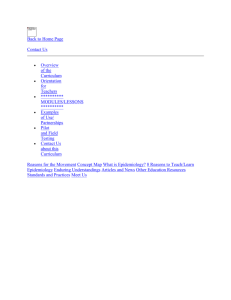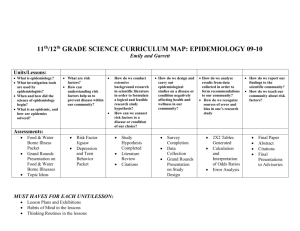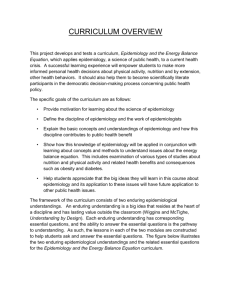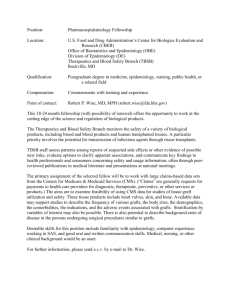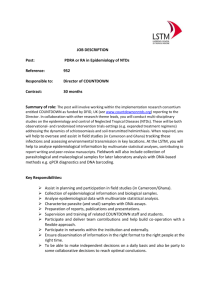FAQ - Teach Epidemiology
advertisement
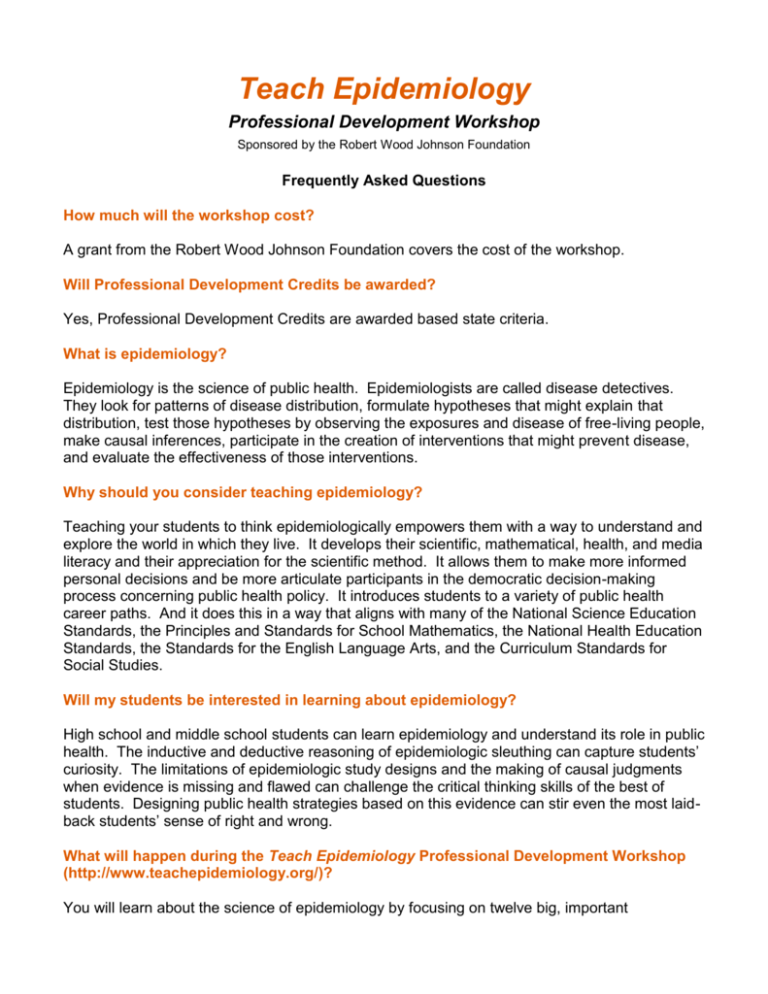
Teach Epidemiology Professional Development Workshop Sponsored by the Robert Wood Johnson Foundation Frequently Asked Questions How much will the workshop cost? A grant from the Robert Wood Johnson Foundation covers the cost of the workshop. Will Professional Development Credits be awarded? Yes, Professional Development Credits are awarded based state criteria. What is epidemiology? Epidemiology is the science of public health. Epidemiologists are called disease detectives. They look for patterns of disease distribution, formulate hypotheses that might explain that distribution, test those hypotheses by observing the exposures and disease of free-living people, make causal inferences, participate in the creation of interventions that might prevent disease, and evaluate the effectiveness of those interventions. Why should you consider teaching epidemiology? Teaching your students to think epidemiologically empowers them with a way to understand and explore the world in which they live. It develops their scientific, mathematical, health, and media literacy and their appreciation for the scientific method. It allows them to make more informed personal decisions and be more articulate participants in the democratic decision-making process concerning public health policy. It introduces students to a variety of public health career paths. And it does this in a way that aligns with many of the National Science Education Standards, the Principles and Standards for School Mathematics, the National Health Education Standards, the Standards for the English Language Arts, and the Curriculum Standards for Social Studies. Will my students be interested in learning about epidemiology? High school and middle school students can learn epidemiology and understand its role in public health. The inductive and deductive reasoning of epidemiologic sleuthing can capture students’ curiosity. The limitations of epidemiologic study designs and the making of causal judgments when evidence is missing and flawed can challenge the critical thinking skills of the best of students. Designing public health strategies based on this evidence can stir even the most laidback students’ sense of right and wrong. What will happen during the Teach Epidemiology Professional Development Workshop (http://www.teachepidemiology.org/)? You will learn about the science of epidemiology by focusing on twelve big, important epidemiological concepts that we call enduring epidemiological understandings. During the workshop you will: Participate in teacher and epidemiologist led discussions in which you will uncover, explore, and develop the enduring epidemiological understandings. In multidisciplinary teams, teach portions of selected existing epidemiology lessons, which complement the enduring epidemiological understandings, to your fellow workshop participants. Engage in in-person and electronic communication with your fellow workshop participants concerning the enduring epidemiological understandings, the degree to which the epidemiology lessons lead to those understandings, the prior knowledge on which you constructed those understandings, the prior knowledge on which you anticipate your students being able to construct their understandings, and how you would teach the understandings to your students. Explore selected news items and how they relate to the enduring epidemiological understandings. Which teachers should consider attending the workshop? Teachers of science, mathematics, health, social studies, and related disciplines Teachers seeking new and creative ways to engage students in learning the scientific method Teachers interested in preparing high school students for the Science Olympiad’s Disease Detective event and the Young Epidemiology Scholars (YES) Competition Teachers of students who are bright but academically disinterested Teachers who prepare others to teach science, mathematics, health, social studies, and related disciplines Who will teach and facilitate the Teach Epidemiology Professional Development Workshop? The workshop will be led by Dr. Diane Marie St. George and Dr. Mark Kaelin. Dr. St. George received a Master’s degree in Health Education from the University of Maryland at College Park and a PhD in Epidemiology from the University of North Carolina at Chapel Hill School of Public Health. She is also an alumna of the W. K. Kellogg Foundation Community Health Scholars Program Post-Doctoral Fellowship which afforded her the opportunity to apply her training in health behavior / health education and epidemiology to the conduct of communitybased public health research. Dr. St. George currently holds the position of Assistant Professor, in the Department of Epidemiology and Preventive Medicine, at the University of Maryland, in Baltimore. Dr. St. George served on the YES Working Group, which authored 26 high school level epidemiology curricular units available online to teachers across the nation. Over the past, Dr. Kaelin has created curricula for and taught epidemiology to middle school, high school, undergraduate, and graduate students. He is a health educator and a professor in the Department of Health and Nutrition Sciences, at Montclair State University. He is a founding member of the Epidemiology Education Movement, a grassroots, sweat-equity organization advocating the teaching of epidemiology in grades 6-12 for the purposes of improving scientific literacy and increasing the number of students preparing for careers in public health (http://www.epiedmovement.org/index.htm). He has led more than twenty epidemiology education professional development workshops for middle and high school teachers and presented at numerous professional meetings. Working with CDC’s Office of Science Education, he helped develop the first Disease Detectives Event for middle school students which is now held on a regular basis as part of the annual Science Olympiad. He was a member of The Robert Wood Johnson Foundation / College Board’s Young Epidemiology Scholars Working Group during which, in partnership with four epidemiologists, he wrote six peer-reviewed teaching units. He has served as a judge for the YES Competition for high school teachers and as a regional and national judge for the YES Competition for high school students. What are the logistical requirements for hosting a workshop? Where: At a mediated venue that can accommodate 25 participants When: During a 1 to 5-day time frame at mutually convenient dates Time: From 8:30 AM - 4:00 PM Cost: Borne by a grant from The Robert Wood Johnson Foundation Meals: Participants are expected to bring or purchase lunch Professional Development: Hours awarded based state criteria Prerequisites: None If I would like to host or participate in the workshop, what do I need to do? Contact Mary Budd at 973-655-6872 / buddm@mail.montclair.edu or Mark Kaelin at 973-6557123 / kaelinm@mail.montclair.edu.
